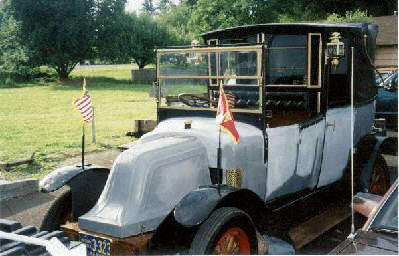by Richard van Pelt, WWI Correspondent
“German Women of Most Heroic Mold” read the front page of the September 7, 1914 Capital Journal. A second headline reads “Germans Pour Over the Meuse” “Parisians Rejoice At Being Passed By – German Plan Evidently Sweep South Over All of France” brought news of German pressure on the French capital. The government, in the face of encroaching German armies, relocated to Bordeaux. The military commander of Paris, General Gallieni, issued the following proclamation:
September 3rd
PEOPLE OF FRANCE!
For several weeks relentless battles have engaged our heroic troops and the army of the enemy. The valour of our soldiers has won for them, at several points, marked advantages; but in the north the pressure of the German forces has compelled us to fall back.
This situation has compelled the President of the Republic and the Government to take a painful decision.
In order to watch over the national welfare, it is the duty of the public powers to remove themselves, temporarily from the city of Paris.
Under the command of an eminent Chief, a French Army, full of courage and zeal, will defend the capital and its patriotic population against the invader.
But the war must be carried on at the same time on the rest of its territory.
Without peace or truce, without cessation or faltering, the struggle for the honour of the nation and the reparation of violated rights must continue.
None of our armies is impaired. If some of them have sustained very considerable losses, the gaps have immediately been filled up from the reserves, and the appeal for recruits assures us of new reserves in men and energy tomorrow.
Endure and fight! Such must be the motto of the Allied British, Russian, Belgian, and French armies.
Endure and fight, while at sea the British aid us, cutting the communication of our enemy with the world.
Endure and fight, while the Russians continue to advance to strike the decisive blow at the heart of the German Empire.
It is the duty of the Government of the Republic to direct this stubborn resistance.
Everywhere Frenchmen will rise for their independence; but, to insure the utmost spirit and efficacy in the formidable fight, it is indispensable that the Government shall remain free to act.
At the request of the military authorities, the Government is therefore temporarily transferring its headquarters to a place where it can remain in constant touch with the whole of the country.
It requests members of Parliament not to remain away from it, in order that they may form, with their colleagues, a bond of national unity.
The Government leaves Paris only after having assured the defence of the city and of the entrenched camp by every means in its power.
It knows that it does not need to recommend to the admirable population of Paris that calm, resolution, and coolness which it is showing every day, and which is on a level with its highest traditions.
People of France, let us all be worthy of these tragic circumstances. We shall gain the final victory; we shall gain it by unflagging will, endurance, and tenacity.
A nation which refuses to perish, and which, in order to live, does not flinch either from suffering or sacrifice, is sure of victory.
The face of war changed during these first two weeks of September. There were two strategic visions of a Franco-German war. The German plan foresaw a rapid movement through Belgium and a swift encircling movement that would take France out of the war. With the French defeated they could turn their resources toward Russia. German thinking presumed that the French could be defeated before Russia could effectively mobilize.
French thinking assumed the reverse. The French calculated that Germany would strike first, but would be forced to withdraw troops from the west in response to Russia’s mobilization.
On September 6, 1914, Gallieni desperately needed to move troops to join the army defending Paris. With the fate of Paris in the balance, and a shortage of army motor vehicles and drivers, Gallieni suggested using Parisian taxis. All Parisian taxis and their drivers were immediately assembled at the Esplanade des Invalides.
By September 8, the taxis of the Marne, as they came to be known, had transported about 4000 badly needed soldiers to reinforce the 6th Army facing the Germans at the crucial point of battle near Nanteuil. With Paris saved, France the Taxi Cabs of the Marne entered the lore of this war, much as did the little ships of Dunkirk in 1940.








Leave A Comment